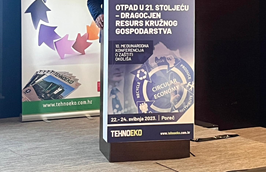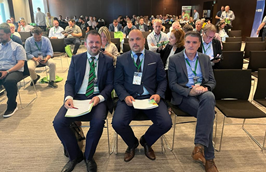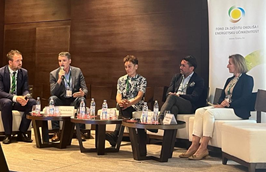24.05.2023.
Director of the Fund, Luka Balen, opened a 3-day 10th expert International Conference “Waste in the 21st century – A valuable circular economy resource”, which was organised by the company Business Media Croatia and the magazine Tehnoeko in Poreč.The speed at which we produce waste is a major environmental problem, but the European Union, aiming to achieve climate neutrality, is fundamentally changing its approach to waste to create a sustainable system based on the principles of the circular economy. This implies reducing the amount of waste we produce, reusing and improving recycling capacities, but also developing innovative technologies for treating part of the waste that is not recyclable. The goal is to minimize waste that ends up in landfills because, in accordance with the 2035 targets, only ten percent of treated municipal waste will be able to be deposited in landfills.
“With our co-financing programmes, the Environmental Protection and Energy Efficiency Fund strives to help local self-government units complete their municipal infrastructure and thus round off the waste management system. In order to do this, the rehabilitation of 225 municipal waste landfills were remediated, 215 civic amenity sites were built or are under construction as are 10 composting plants and 10 sorting plants, and 31 recycling plants for construction waste, and over 1.5 million pieces of different wheelie bins and containers for separate waste collection were purchased. Moreover, three waste management centres were built, and four more are in various stages of construction. Technical documentation for three waste management centres is being prepared,” said Luka Balen, director of the Fund. He pointed out that in the last 5 years, the Fund invested about 130 million euros of national funds in waste management programmes, while about 362 million euros were provided from EU funds.
“Informing and educating the public, as well as cooperation with civil society organisations and the media are key to the good functioning of sustainable waste management. That is the reason this conference brings together a large number of experts involved in all phases of the system, state bodies, local self-government units, municipal service providers, recycling industry, various specialised companies and scientific institutions," said Business Media Croatia Director Nenad Žunec on behalf of the conference organisers.
At the three-day meeting, 300 renowned experts will discuss the challenges that local self-government units and their utility companies face in establishing a waste management system. Some of the topics that the conference will focus on include the question of whether we are ready for the ambitious goals prescribed by EU directives or under the threat of penalties for poor waste management, what is Croatia’s status in relation to the circular economy criteria, and whether the use of waste for energy purposes is still a "mission impossible " due to insufficient understanding of the general public. In addition, experts from the Environmental Protection and Energy Efficiency Fund will present this year's quite generous programmes of co-financing waste management projects, while representatives of the Ministry of Physical Planning, Construction and State Assets will explain the novelties adopted by the amendment to the Physical Planning Act.
In his introductory lecture, international expert on waste management from the Austrian institute in Leoben Renato Šarc, PhD, presented a historical overview of waste management. He pointed out that environmental action plans were adopted in the 9170s, opening the way for the modern concept of waste management. Šarc said that although the waste sector was developing, processes were not happening over night, and there had to be a synergy of all stakeholders as well as a high level of awareness of the public that the circular economy did not require garbage, but recyclates and new recovery technologies









